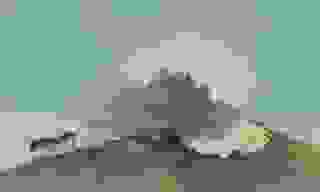


Vibration of the Earth at the intersections of geology and mystical studies through dance traditions.
The Volcano Trilogy traces the creation stories of Java to the present politics of Indonesia, an unique evolution of human culture that was built upon the ruins of Hinduism and Buddhism, later colonised by Islam. The projects weaves together the cultures of catastrophe, resistance and geopoetics, offering insights into the future – a kind of future that is rapidly shifting towards the global Southeast.

“Mount Merapi, colour lithograph, Junghuhn and Mieling, 1853–1854”
The concept of ruins manifests in many fascinating stratifications throughout the history of the island of Java. Today, physical ruins contribute to the cultural production of a Java-centric Indonesia, at the same time, intellectual ruins are deeply rooted in the evolution of ‘Kejawan’ or Javaism–the cultural heritage of Javanese people.
Modern Java, or Indonesia, is shaped by the ruins of Hinduism and Buddhism, and its ideology as a nation has been reconfigured according to the Islamic faith, conditioned by a period of colonial 'reawakening’. This is one way to understand how geology has shaped Javanese culture, ruined by volcanic forces. Travelling back in time, Java as a geological island, began as liquid land formed by these same volcanic forces which created the earth and made culture possible.
The study of geology in Java was initially developed by the colonial Dutch East Indian Company in the 1600s for the search of precious metal reserves. However, their scientific methodology did not escape the Javanese tradition of mystic narratives, where earthly stories would be intertwined with cosmic tales. Known as the mountain of Fire, the Merapi is both a cosmic and emotional being, housing a spectrum of spirits, presence and belief systems.
A mountain is not just a mountain, it is a place of endangered human cultures. The culture of resistance and geo-poetics opens up from the dance tradition of Kubri Siswo [The Great Disciple].
One of the entry points is the tradition of Kubro Siswo, a folk dance from Magelang, Central Java. Its official origins are believed to be based on the spread of Islam on the island of Java and the struggle against colonialism. ‘Kubro’ means ‘great’ and ‘Siswo’ means ‘disciple’, referring to students who have great devotion to God. The music draws from the tradition of Arabic literary epic poems, however, the lyrics are improvised with evangelistic Muslim teachings.
The spirits of the Javanese and their colonisers would linger in the Kubro Siswo dance; it has evolved into a vernacular communal gathering that gives voice to ordinary people and the working class. It serves as a platform to express a wide range of issues, ranging from ancestral roots and Islamic teachings, to climate change and even, the current conflict in Gaza.
The Volcano Trilogy is envisioned as a cinematic dance film, a visual art exhibition and a contemporary dance performance.
KIRI KANAN KIRI (Left Right Left) is a dance performance inspired by the heritage of Kubro Siswo. The performance is an invitation to reflect on the humanitarian crisis of our times. A dance with the politics from left to the right and a timely reminder to dance with empathy.
Five visual study on the islamic propagation with dance and folk tradition from central Java, Indoensia. The documentary film is filmed with the permission of Gunter Siswo collective from Rejosari Village in Magelang





The Great Disciple (2025) 4K UHD 11:36mins - A commission by Haus der Kulturen der Welt- Berlin, as part of the Exhibition" Musafiri - Travellers and Guests " Curated by Cosmin Costinas